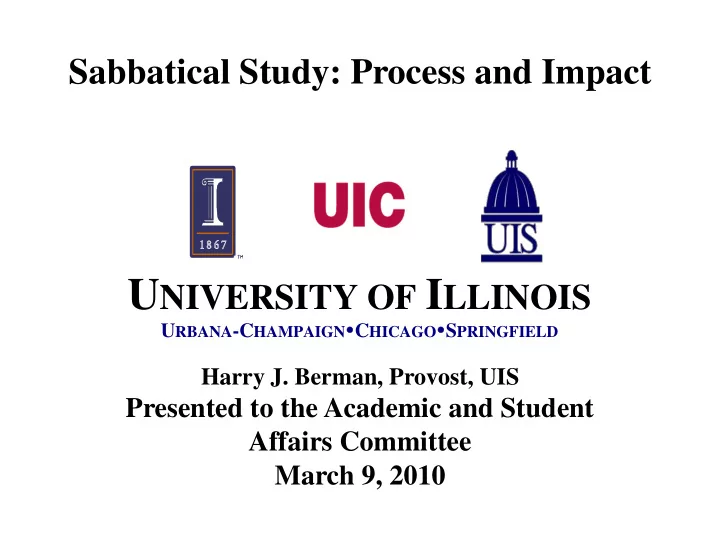

Sabbatical Study: Process and Impact U NIVERSITY OF I LLINOIS U RBANA -C HAMPAIGN C HICAGO S PRINGFIELD Harry J. Berman, Provost, UIS Presented to the Academic and Student Affairs Committee March 9, 2010
Presentation Outline • The rationale for sabbaticals • The process for awarding sabbatical study leaves • Data on sabbaticals proposed for FY 11 o 3 examples of what faculty propose to do
Sabbaticals – Intense Study Leave Sabbaticals provide an essential, highly focused period of time for faculty development – • for the acquisition of new knowledge in a newly pertinent field • for completing research proposals that will fund future research, • for bringing matured projects to completion, • for rethinking courses, majors, the curriculum, and the structure of degrees . Page 3
Sabbatical Process Overview Sabbaticals earned, not an entitlement • Eligibility Criteria • Detailed statement of plans – Leave must enhance the faculty member’s value to the University – The work of the unit will not be disrupted by the leave – Resources need to be identified • Thorough Review – By Unit Head, Dean/Director – Approval by the Provost – Review by Chancellor – Concurrence by Vice President for Academic Affairs • Recommendations submitted to the BOT office • Board Approval Page 4
AY 2010-11 Sabbatical Proposals • 175 Sabbaticals from 96 departments • Semester or year-long • Diverse purposes – Lead a multidisciplinary national team of industry and academicians to prepare a U.S. EPA proposal – Collaborate with international investigators to study the association between pesticides and childhood cancers – Study legislative decision-making through structured interviews of Illinois State legislators Page 5
Impact of Sabbatical Dr. Kara Federmeier Department Psychology College Liberal Arts and Sciences University of Illinois at Urbana
Recommend
More recommend